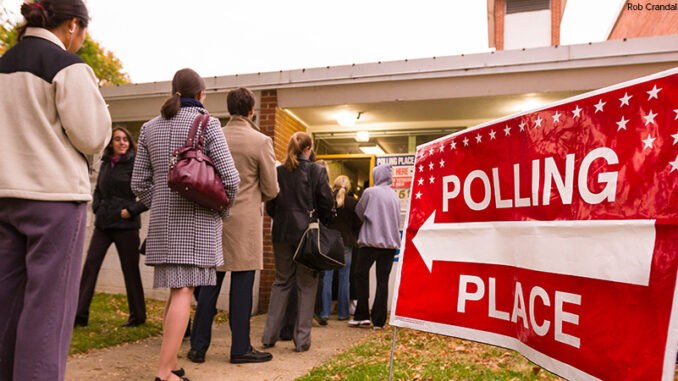
McGrath Wins Kentucky Democratic Primary
If you are a regular news consumer, you’ve probably heard of Kentucky Senator Mitch McConnell, the Republican who is also the Majority Leader of the Senate. Democrats are eager for a chance to defeat McConnell’s reelection attempt in November, but first the Democrats have to complete the primary process. After a long, expensive, and divisive primary season, retired Marine fighter pilot Amy McGrath has narrowly emerged as the candidate who will take on McConnell this fall.
In 2018 Amy McGrath became a nationally-recognized name when she ran for Congress. She didn’t win, but her campaign gained her a lot of notice. So in this election, McGrath had the support of the Democratic Senatorial Campaign Committee and was able to raise $40 million for her campaign. But not all Democrats supported McGrath. Some progressive Democrats were unhappy with McGrath’s past support of Justice Brett Kavanaugh’s appointment to the Supreme Court. (McGrath later backed away from her support of Kavanaugh.) More recently, she again angered some Democrats by not participating in protests related to George Floyd’s death in Minneapolis.
McGrath’s Democratic primary opponent, State Representative Charles Booker, took part in the protests, and also participated in protests in Louisville after the death of Breonna Taylor, a friend of his family’s. Despite McGrath’s name recognition and fundraising advantage, Booker’s campaign gained the support of notable progressives such as Senator Bernie Sanders (Vermont), Senator Elizabeth Warren (Massachusetts), and Representative Alexandria Ocasio-Cortez (New York). Booker based his campaign around fighting systemic racism and addressing voter oppression. It helped him close the gap, but he still fell short in his attempt to claim the primary–finishing with 42.6 percent of the vote, compared to McGrath’s 45.4 percent.
McGrath will face an uphill battle in November. Besides his status as Senate Majority Leader, Senator Mitch McConnell has served for six terms, and Kentucky is a considered to be a solidly “red” state.
Dig Deeper What political positions has McGrath announced during his primary campaign? How do those political goals differ from those presented by the McConnell campaign?
A New State Flag for Mississippi
Over the past several weeks, around the nation, cities have removed Confederate monuments and other controversial memorials. In Mississippi, state lawmakers and the governor have called for retiring and replacing the state flag.
If you’re not familiar with the Mississippi state flag, which has been in place since 1894, it incorporates the battle flag of the Confederacy: a red background with a blue “X,” containing thirteen white stars. Mississippi is the last state of the former Confederacy whose current flag includes this design. This has been the reoccurring subject of dispute between those who want to remove it due to its racist heritage, and those who wish to preserve a reminder to the state’s historical membership in the Confederacy. In 2001, after a statewide vote, 65 percent of the ballots cast supported keeping the flag design.
In the current moment, however, Republican Governor Tate Reeves and both chambers of the Mississippi legislature agree that it is time for a change. Those legislators in favor of redesigning the flag argue that to keep the current flag is a reminder to the state’s 38 percent African American population of their ancestors’ enslavement. There are also economic reasons for the change. Some business representatives testified before the legislature against the current flag, and the NCAA and the Southeastern Conference said that if the current flag remains, they will no longer hold championship games in the state. The decision to redesign the flag was supported by Republican and Democratic legislators alike. The new flag will be designed by a commission and the issue will appear on the November ballot.
Dig Deeper What symbols does your state flag include? Has your state flag changed over time? If so, why?
A New Home for the NAACP
You’ve probably heard of the National Association for the Advancement of Colored People, or the NAACP. For the past 111 years, this organization has fought for civil rights and to advance justice for African Americans. (Their mission statement: “To ensure the political, educational, social, and economic equality of rights of all persons and to eliminate racial hatred and racial discrimination.”)

Now the organization is announcing a big change: it is moving its headquarters from its current location in Baltimore, Maryland, to Washington, D.C. Why? Spokespersons for the NAACP say that the move will give the organization a more visible location that will allow them to more effectively help communities of color and to fight for needed change and equality. The new headquarters will be located at the Frank D. Reeves Center on the city’s U Street corridor. The U Street area is significant because it was once known as “Black Broadway,” and was heavily damaged in the 1968 riots that followed the assassination of Dr. Martin Luther King, Jr.
The move to the nation’s capital is something that has been on NAACP leaders’ minds for many years. Still, it won’t happen right away. The Reeves Center is currently being redeveloped, and it’s likely that the current building will have to be torn down. The building was named for Frank D. Reeves, an NAACP lawyer who played an important role in the legal argument for the Brown v. Board of Education school desegregation case.
Dig Deeper Who started the NAACP? Why? How has this organization evolved and changed since its beginnings in 1909?
Voting Arenas?
Now that most sports programs and concerts are on hold due to the global COVID-19 pandemic, what can be done with all these empty stadiums and arenas?
One idea, thanks to the Atlanta Hawks profession basketball team–use them for socially-distanced polling places.
The Hawks announced last week that it will transform its empty arena into Georgia’s largest-ever voting precinct for the state’s August and November elections. The Hawks organization will also train hundreds of the arena’s staff to serve as poll workers. Because of the size of the arena, hundreds of voting machines can be spread out so that voters can practice safe social distancing techniques while completing their ballots.
And the Hawks aren’t stopping there. The basketball organization is also offering free parking for voters at more than 1,500 spaces around the stadium, and the arena’s billboards will be used to promote “get out the vote” messages beginning in July. Players will be recording social media advertisements encouraging people to vote early to avoid long lines at the polls. And the practice court will be used to process and count absentee ballots. Head coach Lloyd Pierce — who is also the chair of the NBA’s racial justice committee and an outspoken leader on issues of social justice — encouraged other teams to follow the Hawks’ example and open their arenas up to voters as well.
Taking steps to make voting easier, safer, and more transparent is especially important in Georgia. Last month’s primary drew national attention as some Georgia voters, predominantly in neighborhoods of color, waited in lines for several hours or more in order to cast their ballots.
